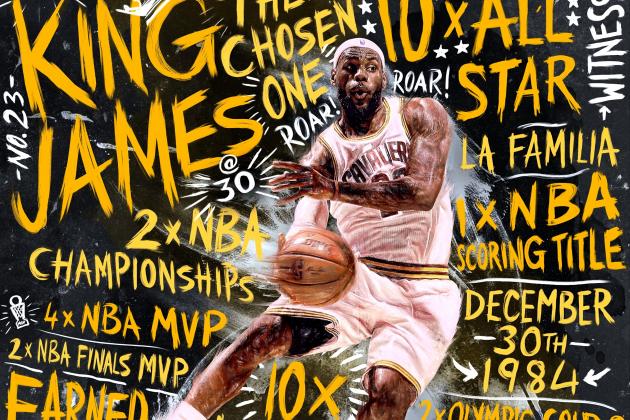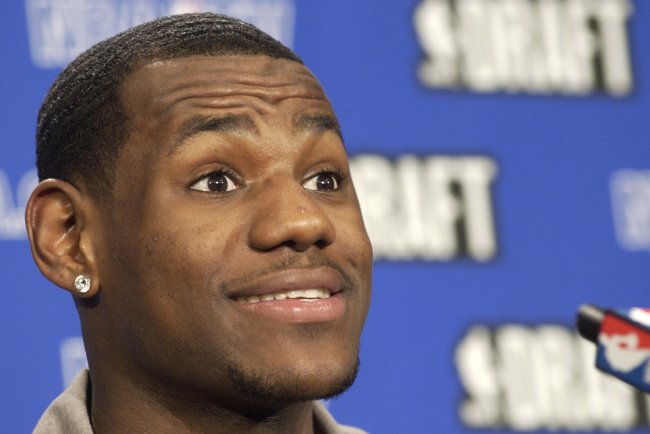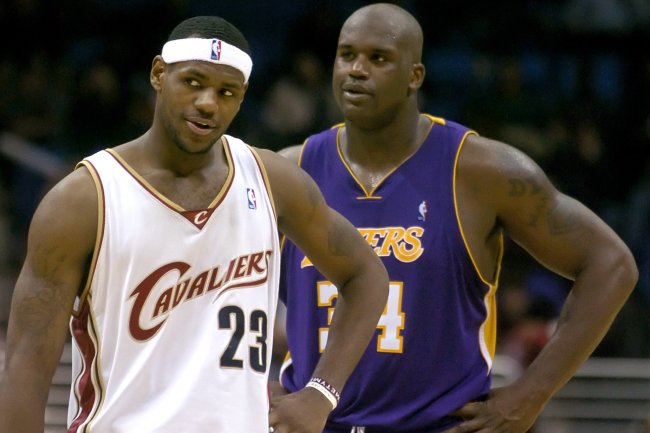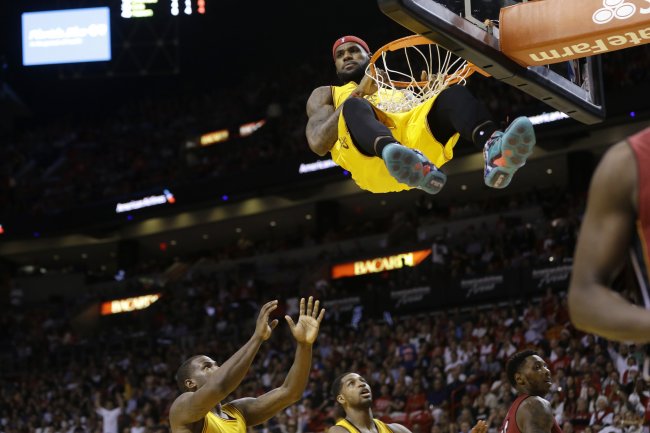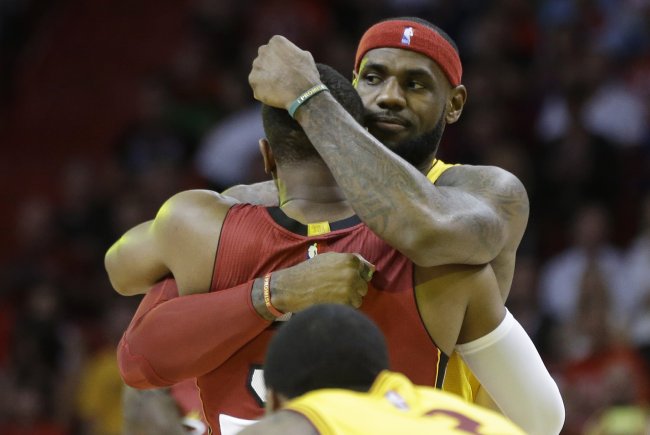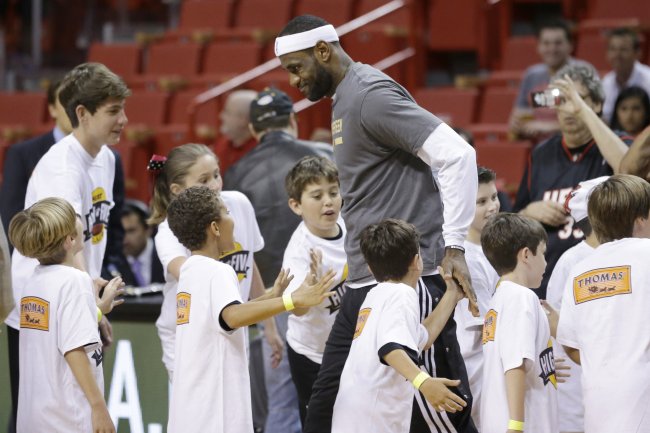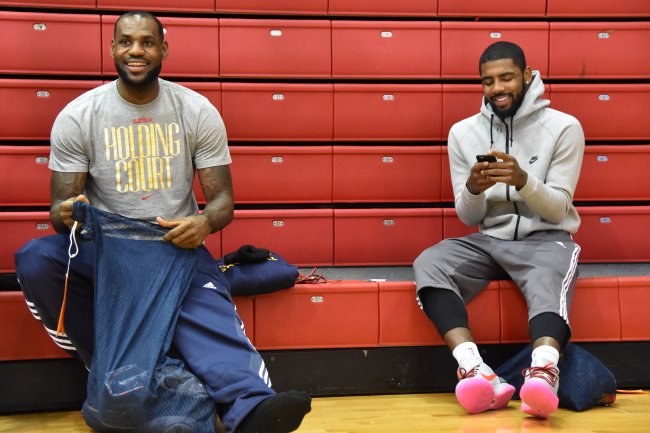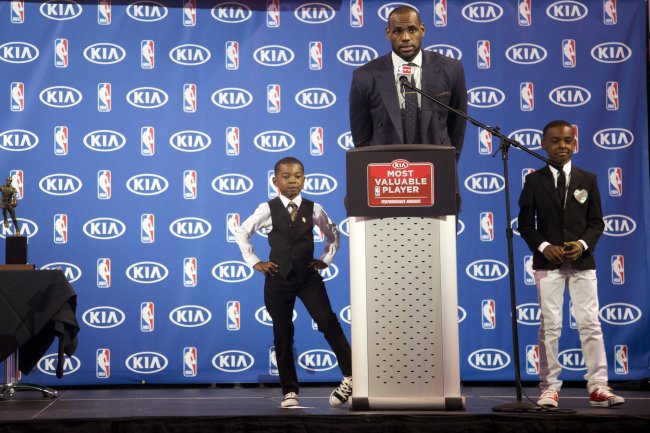B/R: We've talked about that before, that you'd rather be known for intelligence than athleticism.
LJ: Obviously, intelligence doesn't make the highlights. (Laughs)
B/R: No, but that's an interesting question. That's not just you. People don't generally appreciate that as much in society.
LJ: Well, it doesn't get talked about in our sport. It just doesn't. You know, the dunks, the long-range shooting, the guys that play above the rim. It doesn't get talked about. We don't really talk about the guys that really think the game.
Maybe it's because there's just not a lot of guys that really think the game. We have a couple that I know that when you play against them, they're thinking the game.
Chris Paul. Tim Duncan. Those guys. Those guys.
Dwyane Wade. Those guys are thinking the game before it happens. But there's less of us than the guys who are flying above the rim.
B/R: Kobe Bryant (on Dec. 14) got celebrated for passing Michael Jordan in points. You've talked a little bit about your appreciation for what he's done. As you watch him and the way he's handling things six years down the line from where you are, does it make you think about how you might handle things? And also, you are more than 2,000 points ahead of where he was at age 30.
LJ: Absolutely.
Absolutely. Come on, man. This is the longest shortest career of anything. I think about all the time, what's next for me in the next couple of years, you know 35, and then if I make it to get where Kobe is, you know. How do I approach the game? And what is my mindset? And is my love for the game still there? I
absolutely think about that stuff. I mean, how could you not? I mean, I've been in this league 12 years, and it's not like I'm going up
another 12 years. You know, my escalator is starting to tail. So I understand that.
LeBron James' Career Stats
Season Tm RPG APG PPG
2003-04 CLE 5.5 5.9 20.9
2004-05 CLE 7.4 7.2 27.2
2005-06 CLE 7.0 6.6 31.4
2006-07 CLE 6.7 6.0 27.3
2007-08 CLE 7.9 7.2 30.0
2008-09 CLE 7.6 7.2 28.4
2009-10 CLE 7.3 8.6 29.7
2010-11 MIA 7.5 7.0 26.7
2011-12 MIA 7.9 6.2 27.1
2012-13 MIA 8.0 7.3 26.8
2013-14 MIA 6.9 6.3 27.1
2014-15 CLE 5.3 7.6 25.2
Career 7.2 6.9 27.4
basketball-reference.com
B/R: Do you know the numbers, though?
LJ: No. I have no idea.
B/R: This is age 30. (James has 23,901 points prior to turning 30 Tuesday, compared to 21,619 for Bryant, 21,541 for Jordan, 18,638 for Kareem Abdul-Jabbar and 16,987 for Karl Malone at age 30)
LJ: That's everybody at age 30? And that's [Abdul-Jabbar] at age 30?! Wow! And he went nuts after that! That's crazy. That's crazy.
B/R: Could you see yourself going nuts until (close to) 43?
LJ: Oh my God! Oh my God! He played [that long]. That's ridiculous.
B/R: What is the legacy that you want to leave on the league?
LJ: You know what, that's for people to talk about. For me, I want to just be—I was a great teammate, I worked my butt off, I prepared the right way every single night to help my teammates win. When I'm done with this game, just hopefully I've made a mark on this game that people just remember me for the good things. For me loving the game. For me appreciating the game. For me never taking the game for granted, man.
I just think I owe it to it. I owe it to the game. The game has given everything to me. For me to talk about what I want to leave behind, I leave it to people to try to figure it out, I guess.
Lynne Sladky/Associated Press
B/R: But does it still matter to you to be the best player ever?
LJ: As long as I'm out there on the floor. (Laughs). As long as I'm out there on the floor, I'm trying to be the greatest ever. And along that line, being the best man I can be, being the best father, all along that same thing, all on that same path. I've got a chance to be part of some great things while I'm part of this NBA thing. And I want to maximize everything, both on and off.
B/R: You've taken a role in players getting more of a say in the way that things go. You were active in the last lockout. It does seem like you want to leave the league a better place for them.
LJ: Oh, absolutely. Absolutely, man. Listen, man, this is the game of basketball I love and would do for free. And they let us travel all over the world and be able to support our families and do that stuff that I would do anyway. Find me nine other guys and I'm ready to play. I'm ready to play.
The least I can do is give back to this game, and hopefully this game continues to grow when I'm done. And these kids that's coming into our league, these young men that are playing in our league that have to continue to carry it on when, eventually, at some point, I'll be done…hopefully, I've just left them enough of the blueprint where they can just keep it going.
B/R: Is there something that between 30 and 35, or 40, by the time you're done, that you'd like to see changed in the league?
LJ: Fundamentals. Fundamentals and the thinking game. That's what I would like to change. There's not many guys that think the game. And the fundamentals are not where they used to be.
B/R: Why do you think that is?
LJ: I don't know. I don't know if it's the little league coaches or AAU ball. I just don't think the game is being taught the right way. I'm not saying every coach. Because I know my little league coaches were great, and they taught the fundamentals, and we played for team. It has something to do with something. There's a shortage somewhere going on.
Wilfredo Lee/Associated Press
B/R: You've talked about your coach, when you were nine, giving the whole team MVP trophies and putting a focus on team.
LJ: That's it.
B/R: So it's become more individual over time?
LJ: Yeah, I've seen it over time. And it's hard because these little league coaches and these AAU coaches get a player, and he's so good, and they want to win so bad that they just kind of give everything to that kid to keep him around. And hopefully, he doesn't go to a better team or however it goes.
But they stop teaching all the guys, and they stop teaching what this really means. This is a team game, man. This is not about one individual. Not one individual has won a championship or even won anything by himself. Obviously, I know individual accolades come with it but, for me, I've always said if I'm going to accomplish anything individually, it's only going to happen because my team is successful.
B/R: You've also started speaking out more on issues outside of basketball. When did you start to feel you should do that? Is that about getting closer to 30?
LJ: I just think it's the natural course of maturity, being comfortable and then understanding and figuring out who you are. It takes guys and women and people, it takes them a little while to figure out who they really are. And you look in the mirror, and you're like: This is who I want to be; this is what I stand for. And I stand for a bigger purpose than just me. I know that.
B/R: When did you realize who you were?
LJ: It's not a one-moment thing, man. I think definitely going to
Miami helped that, getting an opportunity to get away from my comfort zone, getting away from my family, and just getting away and just kind of seeing [things] in a different light. I think that helped.
B/R: You had your first child right before you turned 20. Now, just before 30, you have three. What do you know about fatherhood that you didn't then?
LJ: (Laughs) There's no encyclopedia or book about parenthood. You learn on the fly. And, as a parent, if you have multiple kids, you can't teach them all the same thing because they all have different personalities. They're their own person. And I understand that. The way I can talk to one of my kids has to be different from the other one, because how they react and how they take in the knowledge is different.
And what's funny is it's a lot like being a leader of a basketball team. How I speak to Dwyane Wade is different from how I speak to
Chris Bosh. How I speak to Mario Chalmers is different from how I talk to Norris Cole. How I talk to
Kyrie Irving is different from how I talk to Kevin Love. It's how they receive the knowledge and how it processes into their mind—that's how you know you're doing it the right way. Being able to understand their personalities, and understand their mind, on how they take the knowledge.
Jesse D. Garrabrant/Getty Images
B/R: But nobody can really know whether they're a good parent or not…
LJ: No, you can only give them the road and the path and hope that they follow.
B/R: Your sons will be teenagers soon...
LJ: Yup, a 10-year-old and a seven-year-old. Not that far away.
B/R: They have had a much different upbringing than you did...
LJ: Absolutely.
B/R: What do you want them to understand about the world?
LJ: I want them to understand they have to be true to themselves. Every time they step outside the household, they are representing not only themselves but also our family name. Respect women, at an all-time high. And every decision that you make, you have to understand that sometimes there are consequences that go with that decision. And if you understand that, you'll be all right.
And also, not be afraid to talk to their parents. Their dad has seen it all, man. And by the time they are teenagers, I'll have seen even more. So there's nothing that I can't give 'em. Obviously, they have to live their own life and, as a parent, I have to be able to take a little step backwards to allow them to go out and have some pitfalls and have some situations where they have to learn from experience. Because their dad did that. But not be afraid to talk to them.
J Pat Carter/Associated Press
B/R: When do you feel they are proudest of you?
LJ: I don't know yet. I have no idea, man. But being able to come home, especially after a long road trip, and seeing them in the house, my boys running around—obviously my daughter is too small to be running around right now—that's a blessing. I'm very blessed.
B/R: How does someone like you, who has lived this sport since they were eight, nine years old, how do you think you'll handle the next chapter in your life?
LJ: Nothing, nothing will ever be able to replace this. Nothing. Nothing. The camaraderie with your teammates. The competition versus the opposition. The thrill of being able to play in front of 20,000 people every night. Your butterflies. Everything that goes with this. Nothing will be able to replace it. And I understand that. How do you set yourself up for it after? I don't know. That's something that you need to figure out. And I've been able to set myself up now, at almost 30, to where I can have different options.
B/R: So we won't see you on the golf course?
LJ: (Laughs) No good. I'm terrible.
B/R: At 40, will you still be on one of these?
LJ: On a team? I hope so. I want to be around the game. One way or another.
Ethan Skolnick covers the NBA for Bleacher Report. Following him on Twitter at @EthanJSkolnick.
